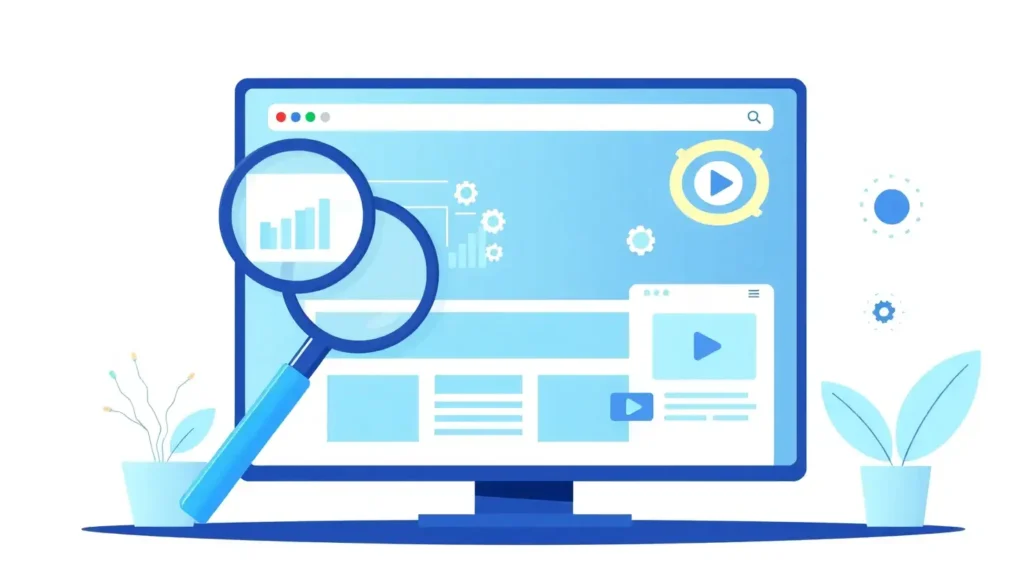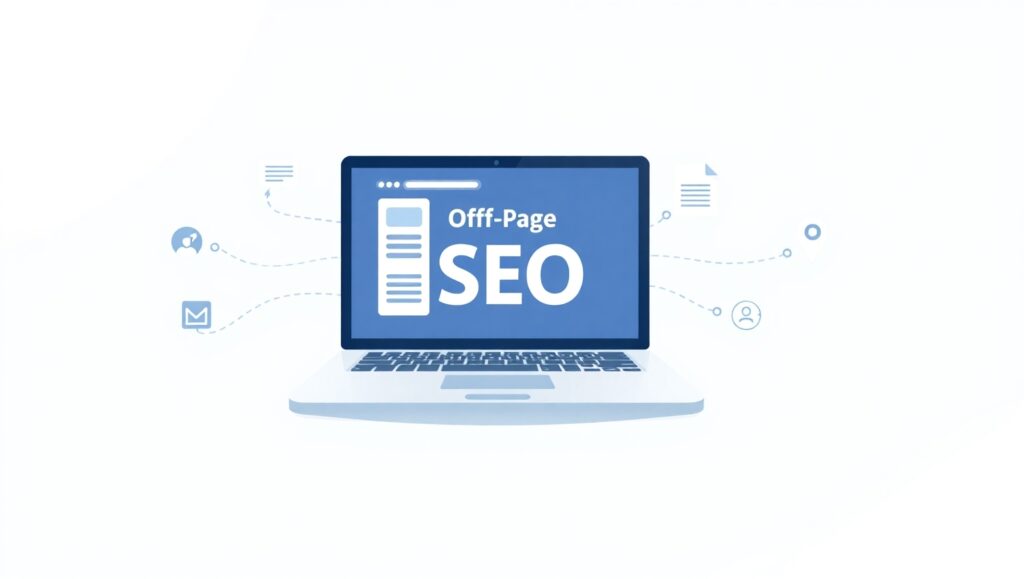Every business wants to appear on the first page of Google. But ranking high is not only about optimizing your website. It is also about what happens outside your site. This is where Off Page SEO comes in.
Every business wants to appear on the first page of Google. But ranking high is not only about optimizing your website. It is also about what happens outside your site. This is where Off Page SEO comes in.

Think of your website as a shop. On-page SEO is how you design and organize your shop. Off Page SEO is what people say about it outside. If people recommend your shop, write about it, and link to it, more customers will trust you. The same happens online. Search engines notice these signals and reward your website with better rankings.
In this guide, we will explore what Off Page SEO is, why it matters, and how you can master it step by step in 2025.
What is Off Page SEO?
Off Page SEO refers to all the activities you do outside your website to improve its visibility and ranking. The most important part is linking building, but it also includes brand mentions, social signals, local SEO citations, and digital PR.
Google looks at how many websites point to yours. But it also checks the quality of those links. A single link from a trusted site can be more powerful than hundreds of low-quality links.
So, Off Page SEO is not just about backlinks. It is about building trust, authority, and credibility across the web.
Why Off Page SEO Matters
Search engines want to provide users with the most reliable results. To do this, they check how trusted your website is. Off Page SEO gives them those signals.
- Backlinks show trust. If a popular website links to you, Google assumes your content is valuable.
- Brand mentions build credibility. Even without a link, your brand being discussed online is a ranking signal.
- Social signals matter. Shares, likes, and comments prove that people find your content useful.
Without Off Page SEO, even the best content may remain hidden. With it, your content can reach a global audience.
Difference Between on Page and Off Page SEO
To understand clearly:
- On Page SEO is everything you do inside your website. It includes keywords, meta tags, content quality, site speed, and internal links.
- Off Page SEO is everything you do outside your website. It includes link building, outreach, guest posting, and brand promotion.
Both works together. On Page SEO makes your content strong. Off Page SEO makes it popular.
The Role of Backlinks in Off Page SEO
Backlinks are the backbone of Off Page SEO. A backlink is when another website links to your content.
Google sees backlinks as votes of confidence. But not all votes are equal. A link from a high-authority site like Forbes is far more powerful than a link from a random blog.
There are two types of backlinks:
- Dofollow Links: Pass ranking power to your site.
- No follow Links: Do not pass ranking power, but still add traffic and trust.
The goal is to build a natural backlink profile. This means links should come from relevant, trusted, and diverse sources.
Link Building Strategies for 2025
1. Guest Posting
One of the most effective ways is guest posting. Write high-quality content for other websites in your niche. In return, you earn a backlink. Guest posting not only improves rankings but also builds authority and relationships.
2. Broken Link Building
This is a smart tactic. Find broken links on other websites, suggest your content as a replacement, and earn a backlink. It is a win-win because you help the site owner fix a problem.
3. Influencer Outreach
Connect with influencers in your niche. Ask them to share or link to your content. If your content provides real value, influencers will be happy to promote it.
4. Digital PR
Press releases, interviews, and news mentions also create strong backlinks. A single mention in a news portal can bring massive authority.
5. Competitor Backlink Analysis
Study your competitors. See where they are getting backlinks from. Use tools like Ahrefs or SEMrush to find opportunities and replicate them.
Other Off Page SEO Techniques
Social Bookmarking
Submit your best content to platforms like Reddit, Mix, and Scoop.it. It increases visibility and brings referral traffic.
Blog Commenting
Engage with blogs in your niche. Write valuable comments, not spam. When done right, it builds relationships and drives traffic.
Forum Participation
Join discussions in forums like Quora and niche communities. Answer questions and share links where relevant. It builds both traffic and trust.
Directory Submissions
Although not as powerful as before, submitting your site to trusted directories can still help with local SEO and citations.
Local SEO Citations
For businesses, local citations are crucial. Get listed on Google Business Profile, Yelp, and local directories. This boosts your local search rankings.
Importance of Anchor Text in Off-Page SEO
Anchor text is the clickable text in a backlink. Google uses it to understand what your page is about.
Best practices:
- Use natural variations of your keyword.
- Avoid over-optimization.
- Mix branded, generic, and exact-match anchors.
This creates a healthy backlink profile and avoids penalties.

Measuring Off Page SEO Success
How do you know if your efforts are working? Track these metrics:
- Domain Authority (DA): Shows the strength of your website.
- Page Authority (PA): Measures the ranking power of individual pages.
- Referral Traffic: Visitors coming from backlinks.
- Backlink Profile Growth: Number and quality of new links.
- Keyword Rankings: Position of your target keywords on Google.
Use tools like Moz, Ahrefs, and SEMrush to monitor progress.
Common Mistakes to Avoid
Many beginners make mistakes that can harm rankings. Avoid these:
- Buying cheap backlinks from spammy sites.
- Overusing exact-match anchor text.
- Ignoring brand building and relying only on links.
- Forgetting about content quality.
Google’s algorithms are smart. They can easily detect unnatural link-building practices. Always focus on white-hat SEO techniques.
Future of Off-Page SEO
In 2025, off-page SEO is not just about backlinks. Google is focusing more on brand signals, trust, and user engagement.
AI tools now help identify spammy practices. So, building genuine relationships, producing valuable content, and earning natural mentions will dominate the future of SEO.
Voice search, video SEO, and co-citation are also becoming important. Businesses that adapt to these trends will stay ahead of competitors.
Conclusion
Off Page SEO is about more than just links. It is about building your website’s reputation, trust, and authority in your industry. By mastering strategies like guest posting, digital PR, influencer outreach, and local SEO, you can boost your visibility and rank higher.
The golden rule is simple: create value, build relationships, and let the web talk about you. When that happens, Google will reward you with better rankings. At Softage Solutions we provide this service.Feel Free to contact with us.
FAQs
Why is Off Page SEO important?
Off Page SEO is important because it signals to search engines that your website is trusted and valuable. The more quality backlinks and brand mentions you earn, the higher your site can rank.
What are examples of Off Page SEO techniques?
Examples include backlink building, guest blogging, forum posting, influencer outreach, social media engagement, directory submissions, and press releases.
How is Off Page SEO different from On Page SEO?
On Page SEO deals with optimizing your website’s content, structure, and keywords. Off Page SEO focuses on external signals like backlinks and authority building.
Does social media affect Off Page SEO?
Yes, social media creates indirect SEO benefits. Shares, likes, and engagement drive traffic, improve brand visibility, and may result in natural backlinks.
How long does Off Page SEO take to show results?
Off Page SEO is a long-term process. Depending on competition and strategy, results can take 3–6 months to become noticeable in rankings.
